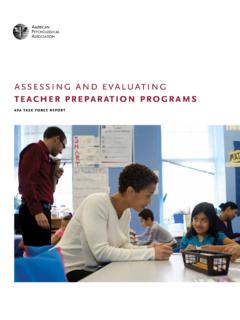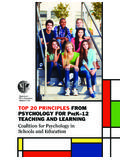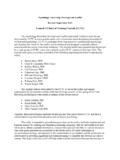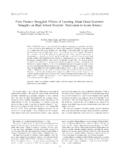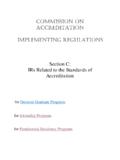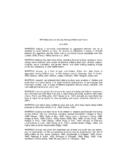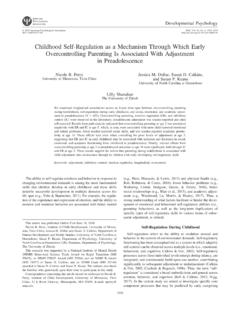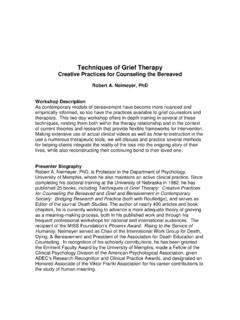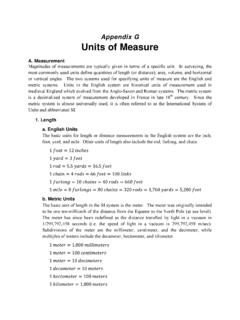Transcription of APA Guidelines for the Undergraduate Psychology Major
1 APA Guidelines for the Undergraduate Psychology Major version August 2013. APA Guidelines for the Undergraduate Psychology Major version APA Board of Educational Affairs Task Force on Psychology Major Competencies (2012). Members APA Staff Liaisons Jane S. Halonen (Chair) G. William Hill IV Jerry Rudmann Martha Boenau University of Kennesaw State Irvine Valley College Robin Hailstorks West Florida University Michael Stoloff William Buskist Carolyn Enns, Cornell James Madison Auburn University College & APA Board of University Educational Affairs Dana S. Dunn Nadine Kaslow Moravian College R. Eric Landrum Emory University &.
2 Boise State University APA Board of Directors James Freeman University of Virginia Maureen McCarthy Kennesaw State University This document is the most recent revision of the document originally titled APA Guidelines for the Undergraduate Psychology Major , first approved by the APA Council of Representatives in August 2006. This first revision is effective as of August 2013. and supersedes the previous version. It is available online at Printed single copies are available from: Precollege and Undergraduate Education Education Directorate American Psychological Association 750 First Street, NE. Washington, DC 20002-4242.
3 202-336-6140. Email: Suggested bibliographic reference: American Psychological Association. (2013). APA Guidelines for the Undergraduate Psychology Major : Version Retrieved from Copyright 2013 by the American Psychological Association. This material may be reproduced and distributed without permission provided that acknowledgment is given to the American Psychological Association. This material may not be reprinted, translated, or distributed electronically without prior permission in writing from the publisher. For permis- sion, contact APA, Rights and Permissions, 750 First Street, NE, Washington, DC 20002-4242.
4 Contents Executive Summary 1 Appendices 47. Appendix A: Introduction 3. Rationale for Parameters of Change 48. Why We Needed the APA Guidelines for the Undergraduate Psychology Major 6 Appendix B: Formal Linkage Between Original Why We Need Guidelines 8. Guidelines and Guidelines 49. How Diversity Has Evolved Appendix C: in Guidelines 12. Representation of Sociocultural Conclusion and Encouragement 13 Focus in Guidelines 59. Framework of Guidelines 15 Appendix D: A Summary of the Learning Goals 15 Recommendations for The Comprehensive Learning Goals 17 Strengthening Quality in the Undergraduate Psychology Major 62.
5 Goal 1: Knowledge Base in Psychology 17 Appendix E: Roster of Job Prospects Goal 2: Scientific Inquiry for Psychology Graduates 65. and Critical Thinking 20. Appendix F: Goal 3: Ethical and Social Roster of Advisory Groups/Reviewers 67. Responsibility in a Diverse World 26 Appendix G: Roster of Independent Goal 4: Communication 30. Contributors/Reviewers 68. Goal 5: Professional Development 33. Sociocultural Learning Outcomes: The Infusion Approach 38. Looking to the Future 41. References 43. iii Executive Summary the APA Guidelines for the Undergraduate Psychology Major : Version (hereinafter referred to as Guidelines ) represents a national effort to describe and develop high-quality Undergraduate programs in Psychology .
6 Guidelines grew out of an expectation expressed in the first iteration of the Guidelines that policy documents on curricular matters should be living documents . meaning that the recommendations must be systemati- cally revised over time to ensure their relevance. The task force charged with the revision of Guidelines exam- ined the success of implementing the original document and made changes to reflect emerging best practices and to integrate Psychology 's work with benchmarking schol- arship in higher education. Guidelines abandoned the original dis- specific courses ( , scientific reasoning tinction drawn between Psychology -focused and critical-thinking skills developed in skills and Psychology skills that enhance research methods and statistics courses).
7 Liberal arts development. Instead, the new Another Major change in Guidelines is Guidelines describes five inclusive goals the emphasis on the advantages of studying for the Undergraduate Major that repre- Psychology as a strong liberal arts prepara- sent more robust learning and assessment tion for attaining a position in the profes- activities. Developmental levels of student sional workforce. learning outcomes capture expectations at A final improvement in Guidelines both a foundation level, which represents the includes a carefully designed infusion completion of approximately the first four approach to the important goals related to courses in the Major , and a baccalaureate the development of cultural competence and level, which corresponds to the indicators diversity skills development.
8 In the original Guidelines . Although in most cases foundation and baccalaureate develop- mental changes occur across courses in the curriculum, some changes can occur within 1. Introduc tion the APA Guidelines for the Undergraduate Psychology Major : Version captures a set of optimal expectations for performance by undergraduates who are engaged in the study of Psychology . The document outlines five broad goals and corresponding student learning outcomes that represent reasonable departmental expectations for the Undergraduate Psychology Major across different kinds of educational contexts. The selection of the five goals and corresponding student learning outcomes reflects emerg- ing best practices from the scholarship of teaching and learning in Psychology as well as the experiences reported from academic program reviewers.
9 The APA Board of Educational Affairs Task and characteristics of psychological ways Force on Psychology Major Competencies also of thinking. Ideally, foundation courses are developed indicators of progress on student likely to include an introductory Psychology learning outcomes representing two levels of course and a methods course along with development: foundation and baccalaureate. other lower level requirements or electives At both levels, the task force selected indi- that firmly establish the nature of the disci- cators that could reasonably be achieved by pline. The foundation level approximates the students who are successfully pursuing the skills and content characterizing the kinds Major .
10 The task force adopted a develop- of achievements of students who complete a mental approach in identifying indicators to minor in Psychology or an associate's degree promote stronger coherence between levels of with an emphasis in Psychology . Upon com- courses offered in the Major , assist in build- pletion of a good foundation in Psychology , ing meaningful required sequences of study students should demonstrate the impact of to strengthen student success and retention, learning a psychological worldview on how and facilitate smoother articulation between they think about behavior. For example, they community college preparation and baccalau- should apply psychological principles to mak- reate programs.
